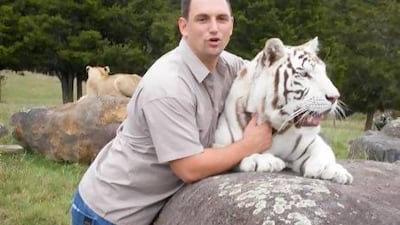DUBAI // Armed with only a toilet brush, an expert from Australia says he can make a better life for big cats kept in private collections in the UAE.
Rob Punton says he has developed training methods to rehabilitate abused or injured cats, and improve the lives of those born in captivity.
The UAE is home to many private collections of exotic animals including cheetahs, lions and tigers.
Mr Punton says the methods he developed over 20 years could be used to ready animals for release into the wild by teaching them the hunting skills cubs learn from their mothers.
"Anyone who loves big cats wants to see conservation prevail," he said.
"People here have a natural love of big cats. There are really good places that are doing conservation work. My argument . is that with any predator, once you remove the need to survive they need to be mentally active."
Some techniques spur animals to behave as they would in the wild. Others shape their behaviour so, for example, a cat is less stressed by visits to the vet. There is no punishment and the only tool is the brush Mr Punton occasionally uses to tap cats on their sensitive noses.
The issue of human contact with captive big cats is controversial, with many experts saying training should not be given and interaction should be kept to a minimum.
Dubai Municipality's wildlife and zoo expert Dr Reza Khan had reservations about Mr Punton's plans, and also questioned whether it was possible to successfully release animals.
"No big cat, once under human possession, can be released back to nature," said Dr Khan, a member of the International Union for Conservation of Nature.
But he conceded some human contact was necessary to care for captive big cats.
"As many people and institutions, for some unknown and unexplained reasons, have taken large wild cats into their own possession they must have proper people at least to give humane treatment to such captive animals."
Mr Punton, 39, quoted a scientific paper by animal behaviour experts Gail Laule and Tim Desmond that he said supported his training techniques.
"It clearly demonstrates that animals prefer to work for their food rather than just being given their food," he said.
"It gives them a degree of control over their life and it reduces the amount of depression they go through. This training can reduce inter-cat aggression and help with pregnancy."
The training is not designed to create circus animals but is focused on welfare and conservation.
Mr Punton is presenting an outline of his plans to wildlife centres in which he says interaction with humans creates "a happier healthy big cat".
He has worked with the animals in Kenya, Pakistan, Thailand, New Zealand and Australia.
Early in his career Mr Punton worked as a volunteer at Howletts animal park in the UK, which encouraged interaction and where three keepers were mauled to death by tigers, although not while he was there.
He said safety was paramount and urged people who lacked his experience not to interact with the big cats. He is opposed to keeping wild animals in inappropriate surroundings.
But Dr Khan feared the idea of a training centre could increase smuggling of the animals.
"I firmly believe once you start a centre to train such large cats in an alien country it will encourage the process of smuggling such dangerous animals out of natural places, where the numbers of most animals are said to be going down.
"We need to discourage people from acquiring wild cats as pets and not encourage [them] to do so for the sake of wildlife conservation."
The UAE is a signatory to the Convention on International Trade in Endangered Species.
Under Ministry of Environment rules, an individual or commercial dealer cannot import big cats, but breeding centres, universities, zoos and authorities licensed by the ministry can, if certain requirements are met.
Those requirements include a veterinarian certificate, a certificate of origin and a certificate issued under the convention.
csimpson@thenational.ae

Big cat expert wants to make a better life for UAE's captive exotic animals
Armed with only a toilet brush, Rob Punton, an expert from Australia says he can make a better life for big cats kept in private collections in the UAE.
Most popular today
